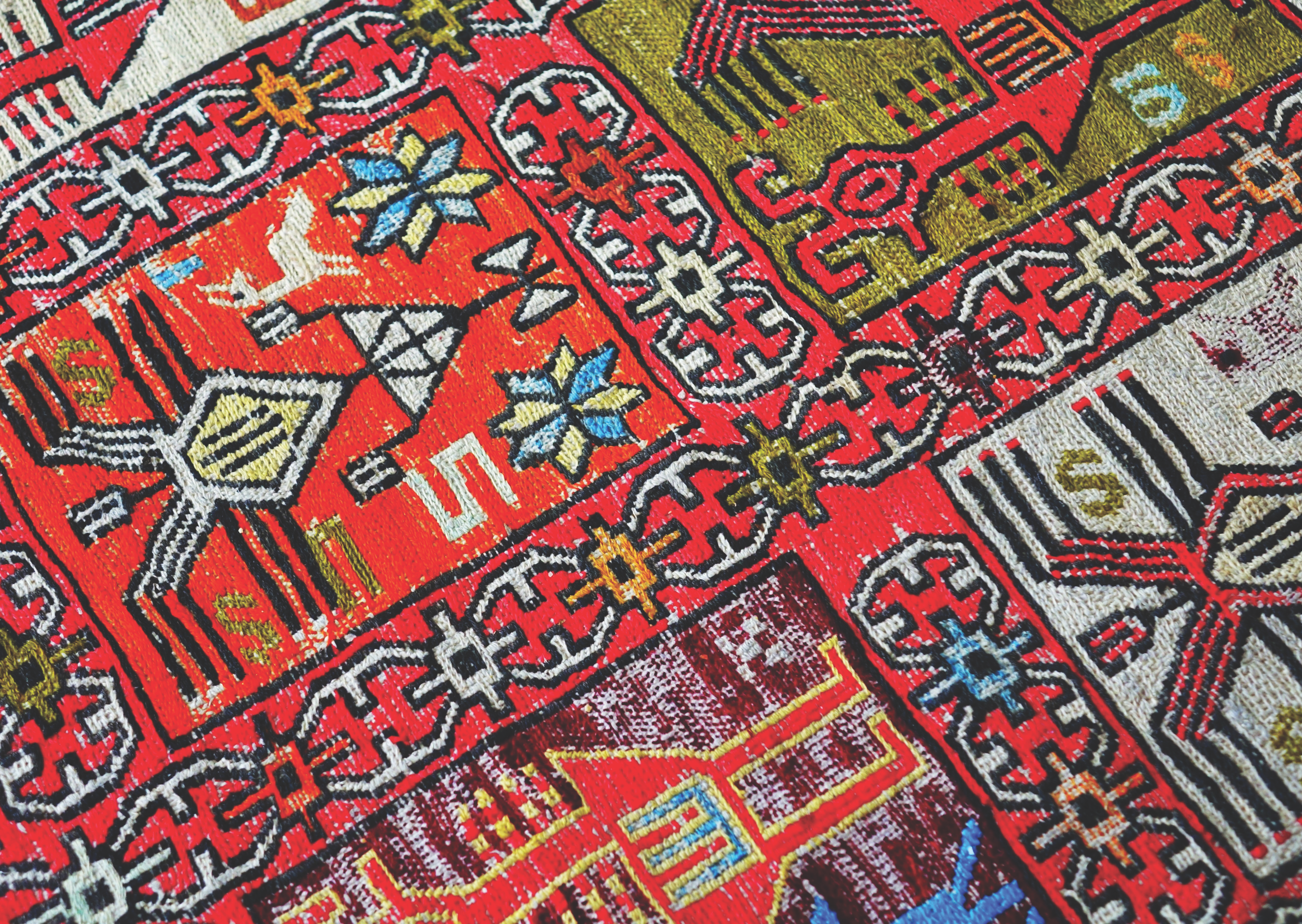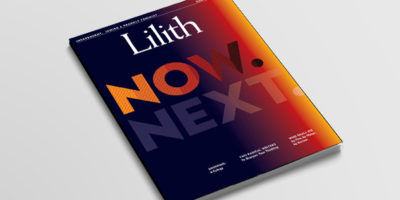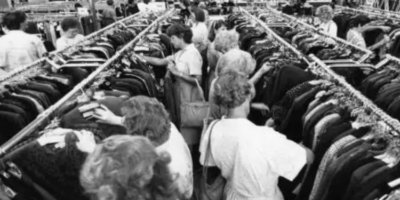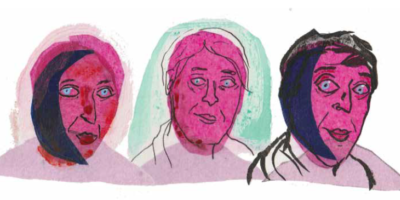
In My Persian Immigrant Family…How My Brother Mothered Me
“Estaire is not here!”
Gwendolyn, my third-grade classmate, had come over to play. As soon as she walked through our front door, dressed in pink-and-blue argyle socks and a matching cardigan, my father gave her a stabbing stare.
“Estaire is not here!” he said icily.
I was standing right there, right next to him, in plain view. Gwen’s eyes met mine. I quickly looked away and tried to hide in the spaces between his words. With a ferocious wave, Pop sent her away and swept back into the living room without a glance in my direction. I was invisible to him. I looked at my feet, touched my elbows, then began shaking like a rag doll. My mind gunked up. Could he be right? Am I imagining me?
The shame was immense. A heart punch. Would Gwen tell our entire class what had just happened? Would she say, “Esther’s father is Iranian and that’s what they do”?
It wasn’t the first time Pop had insisted I wasn’t visible when I was, but I was no less mortified. How could I be unseen when seen? How could I disappear upon demand?
I didn’t call out, “I’m here!” I was afraid of words. Pop often cautioned, “Speech makes lips unclean.” So at age eight, fearing his angry outbursts and wanting clean lips, I chose silence.
I wished my mother were home. She, born with sword in hand, would never have let this happen. She would have shoved Pop aside, invited Gwen in, and offered her trays of piping hot home-made Persian pastries. Gwen would have loved my mother and been fooled into thinking my home was much like hers. She’d never know what I knew.
By third-grade, I was practicing shrinking, abiding by Pop’s rules to avoid his wrath. I ate little, spoke minimally, breathed soundlessly while my mother worked at becoming ever more visible, expanding to the point of bursting, no matter the consequence.
I was a consequence.
Born in 1925 Iran, Mom had been forced to live as an underground Jew in the fanatically religious city of Mashhad, a Shi’ite stronghold and pilgrimage site with a long history of maiming and massacring infidels. Head bent, breathing through a black chador, peering through an eyeslit, she slunk through alleyways, faceless and shapeless, passing as Muslim. The chador was more to her than just a cloth covering. It was the symbol of her suppression and target of her rage. Years later, Mom told me about one sun-scalding summer afternoon when she and her stepmother, Yocheved, were hauling sacks of fava beans home from the market. Both were heavily shrouded, properly groomed, Islamicized for outside eyes. My mother, 14 and recently married to my 34-year-old father, was already three months pregnant. As her cloaked face dripped with sweat, she spat out in Farsi:
“I hate chadors. I’m ripping mine off. Why are we hidden? Why can’t men look at us? We’re allowed to look at their hideous faces, their bare arms and legs.”
“Shh!” Yocheved gestured for her to lower her voice. “The Imams are keeping us safe. A woman’s lips, hair, elbow, even her ankle can drive a man crazy. If we conceal ourselves, men can control themselves.”
While chadors were designed to hide women, hers incubated visions of a headlong and noisy break for freedom. Eight years later, urged on by an older brother who had already emigrated to the United States, she uprooted her husband and two young sons and spearheaded the family’s fretful, lengthy, circuitous migration from Mashhad to Manhattan. On the eve of their departure, Mom lit a match and torched her black chadors, turning heavy cloths and the weight of their meaning to ash.
In New York City, unveiled and thoroughly seen, she speed sorted through Saks Fifth Avenue’s dress racks, searching the very finest. She ran her fingers along crushed velvet, squeezed densely sequined organza, and fondled sumptuous chiffon, scanning for plunging neck-lines that screamed: Look at me. At home she donned bright colors, convoluted patterns, 3-D textures that made me cringe as an adolescent.
My father shuddered with disapproval and deepened their divide by labeling everything she did “unnecessary and excessive.” Too much huff-puff, too much noise, too much upheaval. In Mashhad, Pop had also relied on duplicity to survive, kneeling and bowing in public squares, reciting the Koran, and chanting namaz, while inwardly praying to HaShem, the God of Abraham, Isaac, and Jacob. However, he had experienced Iran quite differently than Mom. While my mother’s face was always concealed, his was always visible, easier to identify as an underground Jew. Even in the secrecy of their home, behind shuttered windows, they both lived in constant fear of being outed.
Treasuring silence, happy with dry toast and tea, he implored Mom to stop the constant activity. “Your noisy hands and feet give me a migraine!” Mom deafened her ears and soldiered on. As ghormeh sabzi bubbled for hours on the kitchen stove, its thick aroma of dill, parsley, scallions, veal, lima beans, turmeric, cinnamon, dried lemons, and mint blanketing our home, Mom was crocheting shawls, embroidering four-yard-long tablecloths while rhythmically pedaling our Singer sewing machine with her right foot, churning out floor-to-ceiling red velvet curtains. By adolescence, I knew Mom wasn’t the woman I wanted to be. Her hustle and bustle weren’t repugnant to me; her driving need to be the best backbreaking housewife who ever lived was. By out-cleaning, out-cooking, she felt she was outshining all other wives. Striving for perfection as she tackled domestic chores seemed foolish, trite—a waste of life. While she stood on top of a ladder, triple-checking ceiling moldings in search of a missed speck of dust, I vanished into Moby Dick, Popular Mechanics, whatever printed matter I could lay my hands on. The more she scraped and scoured our spick-and-span home, the more I dove into schoolwork, disappeared into textbooks, acing every exam. She was loud, latchless, and emphatically visible. I, her polar opposite, navigated my path concealed, seeing much and saying little. While she publicly aired whatever crossed her mind, I conducted inner dialogues I knew no one could hear but me.

By my teens, I had renounced her, telling myself she was vapid and vain—just a random, reckless person I happened to be born from with no real relation to me. I distanced. As mother and daughter, we became intimate strangers.
When I was seven, I’d follow my brother Al into his bedroom and watch with awe as he drew. The rulers and my brother seemed one and the same. He measured winding spaces that spilled open, sunlight bouncing off walls, and the length and breadth of complicated shadows. Museums, concert halls, stadiums, bridges, highways burst from his penciled lines. His dream was to become an architect and sculpt space in ways that had never been done before.
Pop preferred to see Al become a Persian rug dealer. Now that had prestige. According to my father, drawing buildings wasn’t a trade. Mom, on the other hand, wanted educated sons. She licked her lips as she boasted to her butcher, “My son vhant be ar-kee-tect,” not quite knowing what it meant but enjoying the sound of its hard consonants.
When I was eight, Al was awarded a full scholarship to Cornell University’s College of Architecture. With shoulders thrown back and blueprints in hand, he left for Ithaca. I cried for weeks, sorely missing him. Al worried about me. As eager as he had been to escape our war-waging parents, he was also fearful of leaving me behind, less shielded, with only one brother to protect me.
Before each college break and visit home, Al would instruct me to make lists of all my problems, large and small, so that, in the quiet of my bedroom, we could discuss and solve them. And so I did. When I turned 11, Al noticed that my breasts were budding. He never said so, just casually asked if my sixth-grade classmates were wearing bras.
I was amazed. “Al, how did you know? Yeah, in fact Walter Gonzales likes to sneak up from behind and twang bra straps. The girls act real annoyed, but they love it.”
“What makes you think they love it?” he asked.
“Oh, I can tell. It makes them feel sexy.”
“Es, what do you say we go shopping and get you some training bras? We’ll find a saleslady to help us out.”
“This is my sister and she’s never worn a bra,” Al told the saleswoman.
Albert had spotted my breasts? I didn’t think anyone was aware of them but me. Mom hadn’t noticed, and I kind of hoped she wouldn’t. I knew the more my body changed and turned into a woman’s, the harder Pop would push for marriage. If I had to go bra-shopping with anyone, I was glad it was Al.
The very next day we hightailed over to Queens Boulevard and sauntered, hand-in-hand, through Alexander’s department store. Eyeing a triple-chinned, buxom saleswoman standing near the lingerie counter, Albert whispered, “She looks like that British actress Margaret Rutherford. I get a good feeling. Let’s ask her.”
With a solid voice, far beyond his 21 years, he began: “This is my sister and she’s never worn a bra. Do you think—”
Before he could finish, the saleswoman gripped my wrist and whisked me into the dressing room. As if fulfilling her life’s purpose, she measured length, width, breadth, slipping me in and out of styles that fit my bust. Her gray and white jumbo curls bounced as her nimble fingers snapped and unsnapped hooks, rapidly chattering like a Mary Poppins. At one point, standing behind me, she unexpectedly wrapped her arms around my skinny waist and, with tearing eyes, gave me a tight squeeze. I figured she thought I was motherless. Why else would a brother be buying bras for his kid sister?
Margaret Rutherford, looking scrubbed and scoured, ruled out transparency, stretchy beginner bras that flattened my chest, and bras that wouldn’t hold up after multiple washings. Settling on thick white cotton without itchy lace, we returned to Al, who was waiting by the counter. With a generous smile he opened his wallet and bought me five. Glamorized by bras, I felt I had entered womanhood.
All the way home, swinging a shopping bag filled with wrapped- up lingerie, I mused: Will Walter snap my bra straps now?
A few weeks later, Albert came home carrying a small brown paper bag and asked me to follow him into my bathroom. Steeped in silence, he sat on the lidded toilet with his upper lip weighed down by worry.
“Es, I’ve been thinking about your legs.”
“You have?” I groped for words. “What about them?”
“You’re going to start wearing stockings soon, and I want you to look really great. So I asked around and found out: You should never use a razor. It will make your hair shoot up fast and thick.”
I threw up my arms and let out a sigh. “Thank goodness I’m not using razors!”
My brother rolled up his khaki slacks, placed one leg in the tub, opened a tube of Neet and smeared a strong-smelling pink cream all over his bushy shin.
I broke out laughing a younger sibling’s laugh. “Al, you’re crazy! What are you doing?”
“This is a test run. I picked this up for you, but first I want to make sure it won’t sting or burn your skin.”
After waiting the prescribed ten minutes, he rinsed his leg. My mouth fell open as I watched clumps of coarse black hair wash off and spin down the drain.
“Perfect!” he winked. “It doesn’t hurt one bit.”
I reached over, stroked his silky-smooth leg, and cackled uncontrollably.
“Okay, Es. Now it’s your turn.”
Following his example, I coated my legs from ankles to knees with thick pink paste. During our ten waiting minutes, he said my legs were beautiful and reassured me “hair-free they’ll be even more gorgeous.” It all sounded pretty good to me.
A few months later, Al knocked on my bedroom door, clutching a human anatomy textbook. We sat on the floor as he flipped to pre-tabbed pages. In a flat and factual tone, he said he needed to inform me.
“When you hit twelve or maybe thirteen, you’re going to begin to ovulate.”
“Ovulate” sounded awfully close to salivate and mutilate. Acid dripped into the pit of my stomach. Thinking hard and fast, I suspected “ovulate” was some kind of teenage crime I might soon commit… he did say between ages 12 and 13. He was forewarning me to make sure I didn’t screw up.
“Al, I’m scared.” I ripped off a nail. “Tell me what I’m about to do that I shouldn’t.”
My brother turned to colored illustrations of womb, ovaries, eggs, and explained why and how females ovulate and menstruate. I sat stunned. Who knew a nest was growing inside me?
In this thoughtful way Al filled in for Mom, knowing she couldn’t take it on, surely not the way he’d want her to—not the way some American mothers might.
I didn’t know if my mother knew that Al was preparing me for womanhood. If so, she gave no indication, and I didn’t ask. Everything I learned about my body came from Al, until I started high school and grew bold enough to talk over such matters with my closest friend, Bernadette. She and I shared a friendship of secrets, one of which was menstruation. Every high school girl who hadn’t yet gotten her period was obsessed with it: When will it come? What does it feel like? What will it look like? And what do I do when it does show up? Should I buy sanitary napkins now, carry them in my pocket for a year or two, just in case? Or do I do nothing, just wait to be stained? Should I buy tampons? If so, don’t I need to know where they go? The girls who had gotten their periods weren’t talking. It was as if they had all joined some exclusive club. I couldn’t discuss any of this with my mother; nor could Bernie with hers. Bernie did some research and found out that we have a narrow road inside us that leads to an inner room, but neither of us knew where this road was.
One afternoon, she brought over a box of Tampax and behind shut doors unfolded the diagramed pamphlet.
“Wow,” we both sighed.
“Mom makes me feel like what I know is there just isn’t,” I told Bernie. “I may think I have a uterus, but she acts like I don’t. Only Mom determines what’s real, even if it isn’t. A total brain-blitz.”
“Es, that’s nuts.”
“But I have Al….”
—
Esther Amini grew up in Queens, New York in a Persian-Jewish household, the American-born daughter of parents who had fled Mashhad, Iran. In her memoir Concealed, she tells of being caught between these two worlds.





